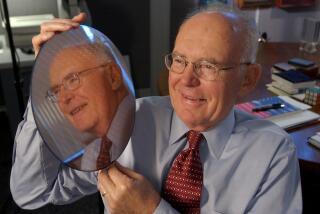Winner of Chip Patent May Gain From New Case
- Share via
Gilbert P. Hyatt, the little-known La Palma engineer who recently won a patent for inventing the microprocessor after a 20-year battle with patent examiners, said Sunday that he will testify in a patent-infringement suit between Zenith Data Systems and Texas Instruments.
While the case does not revolve around the invention itself, it may help Hyatt obtain millions of dollars in royalties because the testimony could establish a legal record for his claim that he created the microprocessor. The “computer on a chip” is the basic building block of most electronic devices, from personal computers to VCRs.
Now that Hyatt has been awarded the patent for the chip, the next step in his obtaining royalties is enforcing the patent.
The legal record resulting from the TI case may prevent him from having to file a money-draining lawsuit against a computer chip company as a means of enforcing the patent. Hyatt, a self-employed engineer who earns less than $40,000 a year, said he does not yet have the resources to challenge his larger potential adversaries in court.
Hyatt said Zenith approached him about the case a month ago, and he negotiated an agreement in which he will testify and provide technical expertise. The company will compensate him for his time and expenses.
In its suit, filed last November against laptop-maker Zenith Data Systems, Dallas-based Texas Instruments is seeking royalties for a number of patents that relate to microprocessor technology and how a microprocessor interacts with other systems within a computer.
Zenith Data Systems, the former computer subsidiary of Chicago-based Zenith Electronics Corp., which was sold to Groupe Bull of France, is seeking to declare the patents invalid.
“From our position, we can’t comment on Zenith’s tactics and what role Mr. Hyatt would play,” said Jim Dukowitz, manager of corporate relations at Texas Instruments. “Our suit is not about who invented the microprocessor.”
But some of the patents Texas Instruments seeks to enforce stem from work performed by Gary W. Boone, the TI engineer who the company contends holds the basic patent on the microprocessor. Boone was issued patents relating to the computer on a chip in 1973 and 1978.
Hyatt, who originally filed for his patent in December, 1970, contends that his work predates Boone’s, as well as that performed by Ted Hoff for Mountain View-based Intel Corp. Intel officials have declined comment on Hyatt’s patent. Hoff declined comment Sunday. Attempts to reach Boone through TI were unsuccessful.
“Mr. Hyatt’s patent on a single-chip microcomputer architecture predates the Boone patents cited by Texas Instruments in their infringement claim,” said Gregory L. Roth, Hyatt’s lawyer. “As a fact witness and technical expert for Zenith Data Systems, Hyatt will demonstrate that his work precedes the patents that are at issue in this case.”
Patent examiners gave Hyatt’s claims a stamp of approval when they awarded him a broad patent in July for work he performed in 1968, but enforcement of the patent has not yet been tested in the court system.
“I think it’s important to clear the air,” Hyatt said. “The historical events will come out and be part of the record. My patent is the basic one, it is enforceable and it predates anyone else’s.”
Hyatt’s testimony could affect several lawsuits involving attempts by Texas Instruments to enforce patents relating to the functions of the microprocessor.
In addition to Zenith Data Systems, TI has also sued Austin-based Dell Computer Corp., Samsung and a number of other chip makers. TI’s patent-enforcement attempts provoked a countersuit in September by computer maker Tandy Corp., which accused TI of unfair business practices.
In its suit filed in U.S. District Court in San Francisco, Ft. Worth-based Tandy accused TI and Boone of fraudulently securing their basic patent even though they knew that the technology had been developed first by others such as Hoff. TI officials called Tandy’s lawsuit a “typical countersuit” without substance.
Hyatt declined to comment on whether he would testify in those cases. He said no date has been set for his testimony in the Zenith case.
More to Read
Inside the business of entertainment
The Wide Shot brings you news, analysis and insights on everything from streaming wars to production — and what it all means for the future.
You may occasionally receive promotional content from the Los Angeles Times.









